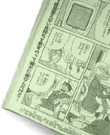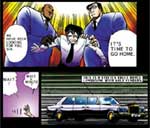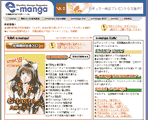Manga: Fitting into New Media
Back to Contents of Issue: May 2001
|
|
|
|
by Michael Thuresson |
|
 IN JAPAN, THERE'S USUALLY more going on than meets the eye. This certainly applies to manga (Japanese comics), an extremely popular and diverse style of fiction. To the kanji-illiterate observer, these comics can appear dreadfully shallow. However, behind their superficial appearance often lurks emotionally deep and brilliant content. "The cinematic and storytelling techniques, plus the depth of plot and characterization, have all been refined into an art form," says Eri Izawa, a bicultural Japanese-American manga critic and a game designer in the US. IN JAPAN, THERE'S USUALLY more going on than meets the eye. This certainly applies to manga (Japanese comics), an extremely popular and diverse style of fiction. To the kanji-illiterate observer, these comics can appear dreadfully shallow. However, behind their superficial appearance often lurks emotionally deep and brilliant content. "The cinematic and storytelling techniques, plus the depth of plot and characterization, have all been refined into an art form," says Eri Izawa, a bicultural Japanese-American manga critic and a game designer in the US.
Combining contradicting elements is a unique characteristic of Japanese literature that mirrors daily Japanese life. In Japan, there's a constant friction between honne (true feelings) and tatemae (expected social behavior), as individuality conflicts with the deep cultural values of humility and unselfishness. Go to a magazine rack in any business district convenience store at lunchtime, and you'll witness several salariman escaping from their stifling, "yes-man" work lives through the roman (romance) of manga.
"You do not see as many young people reading manga these days in the subways," observes Francois Vermeulen, a Belgium-based journalist who lived in Tokyo in the early 1990s and recently returned for a visit. While it's clear Japan's youth aren't reading keitai-manga yet, their infatuation with mobile communications has altered the manga tradition. "You do not find as many manga in the carriage overhead as before," says Vermeulen. He adds, "This reminds me of a conversation I had about five to six years ago with a 'special adviser' to Kodansha's (Japan's largest publishing company) president. He told me that youngsters were more interested in calling each other on their mobiles than in reading mangas." But what happens when advancements in wireless bandwidth and display technology equip the average keitai with good manga-reading capabilities? Larger-screen mobile devices like PDAs may offer a glimpse at mangas' future. Futabasha, a prominent publishing company known for its salaryman-oriented manga, provides e-manga for Sharp's Zaurus PDA. Zaurus' Web content portal "Sharp Space Town" (www.zaurusworld.ne.jp) has a manga menu that features Futabasha's "e-Comics & e-Novels."
However, e-manga, though snazzy and interactive, is more of a complement to the printed version than anything else. "A potential advantage of Web-based manga is the ability to peruse samples long enough to either be hooked or to decide to move on to a different manga. Trying to find something new and interesting can become an expensive exercise in frustration when manga are sealed in plastic," says Izawa. But unless a reader specifically wants the convenient browsing capabilities of e-manga or has limited access to regular manga because of location, the overwhelming preference seems to be the paperback version. Bagus, a major entertainment center operator, has a 24-hour "Internet Manga" cafe in Shibuya. The name is somewhat misleading, though -- it's simply a Net cafe with an extensive library of print manga. Apparently this is one tradition that won't die easily, even when it's pitted directly against the electronic alternative. "I don't think I will ever completely abandon hardcopy manga. One can't curl up in bed with the average computer, nor can one easily flip back 40 pages with a browser," says Izawa. There's no question the keitai (with its ever-growing offerings of games and content) and the Net (both wired and wireless) have made inroads into manga territory. However, it's hard to imagine traditional paperback mangas disappearing from the coffee shops, coin laundromats, and barbershops where Japanese people pass their free time. |
|
Note: The function "email this page" is currently not supported for this page.


 This same mechanism is at least partly responsible for the incredible popularity of cellphones and other mobile devices here. They provide the same virtual escape from overcrowded, exhausting urban life. They also serve as a direct competitor of manga for the eyeballs of bored train commuters, overworked businessmen, and trendy youths. Is traditional manga giving way to e-manga, or is it being overtaken by video games and other keitai Web content?
This same mechanism is at least partly responsible for the incredible popularity of cellphones and other mobile devices here. They provide the same virtual escape from overcrowded, exhausting urban life. They also serve as a direct competitor of manga for the eyeballs of bored train commuters, overworked businessmen, and trendy youths. Is traditional manga giving way to e-manga, or is it being overtaken by video games and other keitai Web content?
 Cybermanga have also emerged onto the wired Net scene. Japan's two most famous manga publishers have made significant investments in the electronic medium. Kodansha (
Cybermanga have also emerged onto the wired Net scene. Japan's two most famous manga publishers have made significant investments in the electronic medium. Kodansha (


